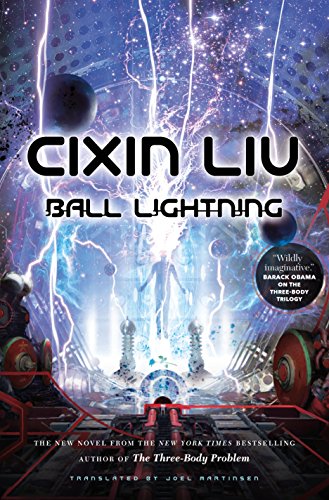![]() Ball Lightning by Cuxin Liu, translated by Joel Martinsen
Ball Lightning by Cuxin Liu, translated by Joel Martinsen
 Ball Lightning (2018) is a story about, well, ball lightning. It’s also about obsession, the travails of science research, the moral perils of military research, and quantum mechanics. And ghosts — in fact, quantum mechanical ghosts. I’m not sure that’s something for everyone, but it’s a lot.
Ball Lightning (2018) is a story about, well, ball lightning. It’s also about obsession, the travails of science research, the moral perils of military research, and quantum mechanics. And ghosts — in fact, quantum mechanical ghosts. I’m not sure that’s something for everyone, but it’s a lot.
The narrator, Chen, is obsessed with the phenomenon of ball lightning for a simple and macabre reason: his parents are incinerated by it in front of him in the book’s first chapter. As reasons for obsession go, this is a strong one; it’s not hard to believe that from that time forward understanding ball lightning is really all he cares about. So he becomes a meteorologist — not the kind that tells you what the weather will be like in a week, the kind who makes elaborate mathematical models of ball lightning. He meets a lot of people who are also obsessed by ball lightning, and finally gets co-opted by the military into helping design lightning weapons, because who else is going to have the time and money to let people poke around with massive lightning generators? (Besides Nikola Tesla, obviously. Incidentally, I feel like Cixin Liu missed a trick by not name-checking Nikola Tesla at some point, since Tesla seems like the perfect patron saint for the lightning-obsessed.)
The potential military applications of his work bring him into contact with Major Lin Yun, a woman with some powerful obsessions of her own — though hers are mostly about finding ingenious ways to kill people, because of how her mother died. The third main character of the book is physicist Ding Li, a rather Sherlockian physicist who is also obsessed — in his case, with the mysteries of physics in general and quantum mechanics in particular. The three of them, spurred by a Sino-American war in which the Americans are deploying weird-physics weapons of their own, are soon on the trail of a ball-lightning-based weapon that might win the war.
When obsessed people get together on a project, they’re often really good at making things happen, and it’s not so very long before our trio get what they want — an amazing, bizarre (and totally imaginary) explanation for ball lightning, an amazing, bizarre superweapon, and amazing, bizarre new physics, respectively. Unfortunately, obsessed people are also very bad at judging the consequences of achieving their goals, and the consequences turn out to be serious indeed — for themselves, China, and human civilization at large.
Ball Lightning is a pretty strange book in some ways — in particular, to me, in that it mixes hard science with comic book physics in odd proportions. It’s not often that you’ll see an author invoke a highly anthropocentric take on the Copenhagen interpretation of quantum mechanical waveform collapse for a plot point.
Overall, I enjoyed Ball Lightning quite a bit. It’s not a masterpiece, but it is well-crafted and has some really nice vignettes (the visit to a lightning-generation facility in Siberia was especially strong, I thought). I think I’ll go look for The Three-Body Problem…



COMMENT Was I hinting that? I wasn't aware of it. But now that you mention it.... 🤔
So it sounds like you're hinting Fox may have had three or so different incomplete stories that he stitched together,…
It's hardly a private conversation, Becky. You're welcome to add your 2 cents anytime!
If the state of the arts puzzles you, and you wonder why so many novels are "retellings" and formulaic rework,…
I picked my copy up last week and I can't wait to finish my current book and get started! I…